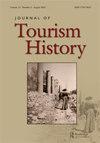没有露营者想要:大规模旅游和比利时特伦特格洛里乌斯“帐篷布度假”的劝阻(1945–'75)
IF 0.3
Q4 HOSPITALITY, LEISURE, SPORT & TOURISM
引用次数: 0
摘要
过度旅游通常被视为一种没有历史的现代现象。本文以比利时众议院的议会程序为例,探讨了对拥挤和承载能力的担忧是如何引发了一场关于在Les Trente Glorieuses(1945 - 1975)露营的旷日持久的议会辩论的。尽管“帐篷布度假”被视为旅游民主化的重要工具,但在比利时的半衰期,它并不总是受到欢迎。在强大的酒店和餐馆老板游说团体的敦促下,保守派代表强调了露营的诸多不便——集中在道德松懈、卫生条件差、缺乏环境规划和生态威胁上——并要求加强监管。与此同时,这些争论被社会民主党人揭露为烟幕,以遏制营地“不受约束”的扩散。在比利时,这场辩论深受北海沿岸有限的承载能力的影响。比利时仅有40英里的海岸线,自然资源匮乏。它推动了一项政策,即优先考虑酒店和度假屋,而露营则受到限制或任其自生自弃。本文章由计算机程序翻译,如有差异,请以英文原文为准。
No campers wanted: mass tourism and the discouragement of ‘tent cloth vacationing’ in Belgium’s Trente Glorieuses (1945–’75)
ABSTRACT Overtourism is often seen as a modern phenomenon without a history. Drawing on the parliamentary proceedings of the Belgian Chamber of representatives, this paper explores how concerns about crowding and carrying capacity already fuelled a protracted parliamentary debate about camping in Les Trente Glorieuses (1945–’75). Even though ‘tent cloth vacationing’ was seen as an important tool to democratise tourism, it was not always applauded in the Belgian hemicycle. Urged by the powerful lobby of hotel and restaurant owners, conservative representatives emphasised the many inconveniences of camping – zeroing in on the loose morals, the bad hygiene, the lack of environmental planning, the ecological threats – and pressed for more regulation. At the same time, these arguments were unmasked by social democrats as a smoke screen to curb the ‘unruly’ proliferation of campsites. In Belgium, the debate was deeply influenced by the limited carrying capacity of the North Sea coast. With barely 40 miles of coastline, Belgium was short of natural resources. It fuelled a policy whereby priority was given to hotels and holiday homes, while camping was curbed or left to its own devices.
求助全文
通过发布文献求助,成功后即可免费获取论文全文。
去求助
来源期刊

Journal of Tourism History
HOSPITALITY, LEISURE, SPORT & TOURISM-
CiteScore
0.60
自引率
0.00%
发文量
16
期刊介绍:
The Journal of Tourism History is the primary venue for peer-reviewed scholarship covering all aspects of the evolution of tourism from earliest times to the postwar world. Articles address all regions of the globe and often adopt interdisciplinary approaches for exploring the past. The Journal of Tourism History is particularly (though not exclusively) interested in promoting the study of areas and subjects underrepresented in current scholarship, work for example examining the history of tourism in Asia and Africa, as well as developments that took place before the nineteenth century. In addition to peer-reviewed articles, Journal of Tourism History also features short articles about particularly useful archival collections, book reviews, review essays, and round table discussions that explore developing areas of tourism scholarship. The Editorial Board hopes that these additions will prompt further exploration of issues such as the vectors along which tourism spread, the evolution of specific types of ‘niche’ tourism, and the intersections of tourism history with the environment, medicine, politics, and more.
 求助内容:
求助内容: 应助结果提醒方式:
应助结果提醒方式:


